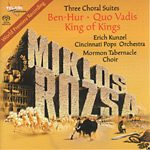Miklós Rósza’s music usually constituted one of the more compelling aspects of the films he scored. This is especially the case in his Biblical epics, three of which are presented here in the form of “choral suites”. A more accurate term, perhaps, would be “suites with chorus”, for while the scores for Ben-Hur, Quo Vadis, and King of Kings make extensive use of choral forces, the music is predominantly orchestral. These suites were compiled and arranged by others–Daniel Robbins in Ben Hur and King of Kings, Christopher Palmer in Quo Vadis–but both editors preserve the epic sweep of Rósza’s music while constructing a compelling moment-by-moment narrative.
Ben-Hur certainly is the best known of the three, with its pulse-pounding “Rowing of the Galley Slaves” and the majestic “Parade of the Charioteers” instantly conjuring the film’s dramatic panorama. Rósza’s evocative choral writing becomes especially transcendent in the “Star of Bethlehem”, “Alleluia”, and “Miracle” sections. Quo Vadis is more overtly vocal, beginning with the movie’s title sternly intoned by the male chorus in the Prelude.
The Mormon Tabernacle Choir’s voluminous and sumptuous sound successfully captures the music’s lush spirituality throughout Quo Vadis and in the somewhat gentler and more meditative score for King of Kings. In “Miracles of Christ” and “Resurrection and Finale” Rósza’s arrestingly beautiful and luminous melodies create moments of near-rapture, while “Feast of Passover” and “Herod’s Feast” flaunt the composer’s skill at recreating the imaginary festive sounds of the Middle East. Erich Kunzel once again displays his knack for presenting film music as of it were born for the concert hall, something he achieves with the virtuoso and fully committed playing of the Cincinnati Pops Orchestra. Telarc’s recording offers vivid imaging, wide dynamics, and crystal-clarity in both regular and SACD stereo, as well as spectacular multichannel playback. For film buffs and serious music lovers alike, this is just plain terrific.
































